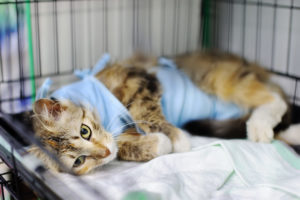
Feline chronic kidney disease is the most prevalent condition in cats over 10 years of age.
At Alexander Animal Hospital, we love cats. These extraordinary animals amaze us daily with their resilience and resolve. However, many cats have their weaknesses, including their renal system. Feline chronic kidney disease is the most prevalent condition in cats over 10 years of age, making it essential for pet owners to understand.
Understanding Feline Chronic Kidney Disease
When we describe feline chronic kidney disease, we describe a continuous loss of kidney function over time. The kidneys are a primary part of a feline’s renal system. Also, the body’s system is responsible for filtering toxins from the blood, releasing them into urine, which is then voided from the urinary bladder. The kidneys also promote red blood cell production. So, cats who experience feline CKD might initially hide their symptoms. Unfortunately, pet owners might notice the following signs as the disease process progresses:
- Decreased appetite
- Bad breath
- Weight loss
- Increased urination
- Vomiting
- Lethargy
- Dull hair coat
- Pale gums
Recognizing the Problem
Proactive pet wellness care plays a significant role in your cat’s life. When one of our veterinarians examines your cat often and completes screening tests such as blood and urine analysis, we have a higher chance of catching things like CKD early. Even if your cat becomes symptomatic, it’s not too late. Fortunately, blood and urine testing can confirm if your cat may be suffering from feline chronic kidney disease.
Managing CKD
Unfortunately, there is no cure for feline chronic kidney disease. On a positive note, we can help maintain the kidneys working well while managing the symptoms and enhancing your cat’s quality of life. The key to managing the CKD patient is maintaining good hydration. In addition, pet parents can participate by:
- Providing multiple sources of fresh, clean water
- Feeding your cat canned foods containing a lot of moisture
- Make sure that your cat’s drinking doesn’t decrease during stressful times like construction, moving, new people in the house, etc.
- Administering fluid therapy if directed by your veterinarian
Lastly, diet is also an essential part of cats with CKD. Feeding them a diet restricted in sodium and phosphorus with moderate protein levels can increase the quantity and quality of life in cats with kidney disease.
We Would Love the Opportunity to Care for Your Furry Friends!
Alexander Animal Hospital is a full-service animal hospital located in Severna Park, Maryland, serving the Severna Park, Pasadena, and Arnold Areas. Our goal is educating clients on the needs of their pets and understanding the importance of individualized veterinary care in order to strengthen the human-animal bond between owners and their pets.
We understand you have a choice when deciding on the care for your pets, and we strive to provide you with unparalleled services including wellness exams, vaccines, lost pet microchip ID, dental care, surgical services, digital radiography, and in-hospital laboratory services and diagnostics. Other highlights of Alexander Animal Hospital are the separate cat and dog waiting and exam rooms, as well as after-hours on-call emergency services.
Please take a look around our website and then give us a call at 410-777-8678 to set up an appointment.
We’re social! Follow us on Facebook, Twitter, and Pinterest for all the latest updates!
